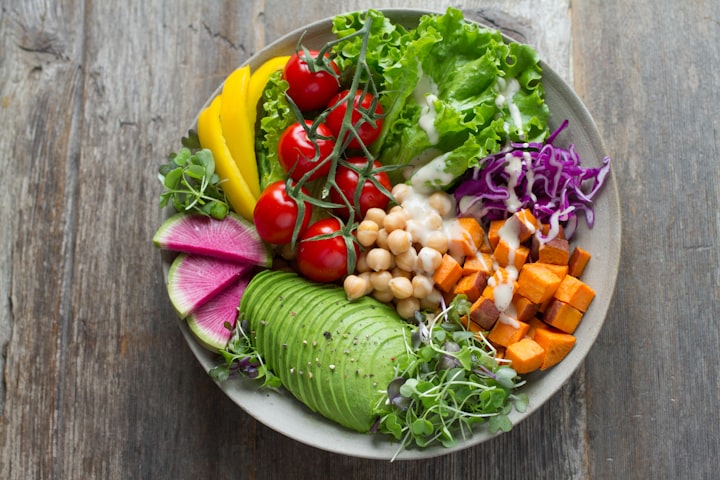Fuel Your Body with Flavor
Discover the Delicious World of Nutritious Eating!

We all know that eating healthy is important, but sometimes it can feel like a chore. The thought of bland, tasteless food can be enough to make anyone want to reach for the nearest bag of chips or candy bar. But what if I told you that healthy eating doesn't have to be boring? In fact, it can be downright delicious! By fueling your body with flavor, you can discover a whole new world of nutritious eating that will leave you feeling satisfied and energized.
First and foremost, it's important to understand that healthy eating doesn't mean you have to give up all of your favorite foods. In fact, many of the foods you love can be made healthier with just a few simple tweaks. For example, instead of reaching for a bag of potato chips, try making your own sweet potato chips at home. Simply slice a sweet potato into thin rounds, toss with a little bit of olive oil and sea salt, and bake in the oven until crispy. Not only are these chips delicious, but they're also packed with vitamins and minerals that your body needs to function at its best.
Another way to add flavor to your meals is by experimenting with different herbs and spices. Not only do these add depth and complexity to your dishes, but many of them also have health benefits of their own. For example, turmeric is a powerful anti-inflammatory that can help reduce pain and swelling in the body. Cinnamon has been shown to help regulate blood sugar levels, making it a great addition to your morning oatmeal or smoothie. And garlic has been shown to have antibacterial and antiviral properties, making it a great way to boost your immune system.
Of course, it's not just about what you add to your meals, but also what you choose to eat in the first place. When it comes to building a healthy diet, it's important to focus on whole, nutrient-dense foods. This means choosing foods that are as close to their natural state as possible, such as fresh fruits and vegetables, whole grains, lean proteins, and healthy fats. These foods are not only packed with the vitamins and minerals your body needs, but they're also more satisfying and filling than processed foods, which can help you avoid overeating and snacking on unhealthy foods throughout the day.
One of the best ways to ensure that you're getting a variety of nutrient-dense foods in your diet is by eating a rainbow of colors. This means choosing fruits and vegetables in a variety of colors, such as red peppers, orange sweet potatoes, yellow squash, green spinach, blueberries, and purple eggplant. Each color represents different vitamins and minerals, so by eating a variety of colors, you can ensure that you're getting a wide range of nutrients that your body needs to function at its best.
Of course, healthy eating isn't just about what you eat, but also how you eat. It's important to take the time to savor your meals and enjoy the flavors and textures of the foods you're eating. This means sitting down at a table, turning off your phone and other distractions, and really focusing on your food. By doing this, you'll be more mindful of what you're eating, which can help you avoid overeating and make healthier choices throughout the day.
In conclusion, healthy eating doesn't have to be boring or tasteless. By fueling your body with flavor, you
Maintaining a nutritious diet is essential for a healthy lifestyle. It can be challenging to stick to a healthy eating plan, especially with the abundance of fast food and processed snacks available. However, with a little effort and dedication, anyone can maintain a nutritious diet. In this article, we will discuss how individuals can help in maintaining nutritious eating.
1. Plan Your Meals
Planning your meals is an essential step in maintaining a nutritious diet. It helps you avoid impulsive eating and ensures that you are consuming a balanced diet. Start by creating a weekly meal plan that includes all the essential nutrients your body needs. Make sure to include a variety of fruits, vegetables, whole grains, lean proteins, and healthy fats.
2. Shop Smart
Once you have planned your meals, it's time to go grocery shopping. Shopping smart means choosing healthy options and avoiding processed foods. Stick to the perimeter of the grocery store, where the fresh produce, meats, and dairy products are located. Avoid the center aisles, where most of the processed foods are located.
3. Cook at Home
Cooking at home is an excellent way to maintain a nutritious diet. When you cook at home, you have control over the ingredients you use, and you can ensure that your meals are healthy and balanced. Try to cook meals from scratch using fresh ingredients. Avoid using pre-packaged sauces and seasonings, which are often high in sodium and preservatives.
4. Portion Control
Portion control is crucial in maintaining a nutritious diet. Even healthy foods can be unhealthy if consumed in large quantities. Use smaller plates and bowls to help control your portions. Also, try to eat slowly and savor your food. This will help you feel full faster and prevent overeating.
5. Stay Hydrated
Drinking enough water is essential for maintaining a nutritious diet. Water helps flush out toxins from your body and keeps you hydrated. Aim to drink at least eight glasses of water a day. You can also drink herbal tea or infused water to add flavor and variety.
6. Snack Smart
Snacking can be a healthy part of a nutritious diet if done correctly. Choose healthy snacks like fruits, vegetables, nuts, and seeds. Avoid processed snacks like chips and candy, which are high in sugar and unhealthy fats. Also, try to snack in moderation and avoid snacking late at night.
7. Eat Mindfully
Eating mindfully means being present and aware of what you are eating. It involves paying attention to your body's hunger and fullness cues and savoring your food. Avoid distractions like TV and phones while eating, as they can lead to mindless eating and overeating.
8. Seek Professional Help
If you are struggling to maintain a nutritious diet, seek professional help. A registered dietitian can help you create a personalized meal plan and provide guidance on healthy eating habits. They can also help you identify any nutrient deficiencies and recommend supplements if necessary.
In conclusion, maintaining a nutritious diet is essential for a healthy lifestyle. By planning your meals, shopping smart, cooking at home, controlling your portions, staying hydrated, snacking smart, eating mindfully, and seeking professional help, you can maintain a healthy and balanced diet. Remember, small changes can make a big difference, so start making healthy choices today!
About the Creator
Okereke Micheal
My latest book explores human relationships and the impact of our choices. With vivid characters and intricate plotlines, I invite readers to delve into the depths of the human psyche and question their beliefs.






Comments
There are no comments for this story
Be the first to respond and start the conversation.